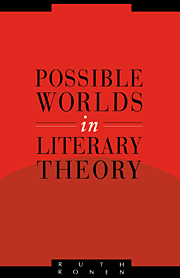Book contents
- Frontmatter
- Contents
- Acknowledgments
- Introduction
- 1 Possible worlds, fictional worlds
- 2 The possibility of fictional worlds
- 3 The Fictionality of fictional worlds
- 4 Fictional entities, incomplete beings
- 5 Fictional events and the intricacies of plot
- 6 Focalization and fictional perspective
- 7 Fictional time
- Conclusion
- Bibliography
- Index
6 - Focalization and fictional perspective
Published online by Cambridge University Press: 12 November 2009
- Frontmatter
- Contents
- Acknowledgments
- Introduction
- 1 Possible worlds, fictional worlds
- 2 The possibility of fictional worlds
- 3 The Fictionality of fictional worlds
- 4 Fictional entities, incomplete beings
- 5 Fictional events and the intricacies of plot
- 6 Focalization and fictional perspective
- 7 Fictional time
- Conclusion
- Bibliography
- Index
Summary
Is focalization specific to fiction?
Worlds, both actual and fictional, are discoursive constructs. Worlds are therefore dependent on instances of discourse responsible for the selection and arrangement of world components. Since information about worlds always has a source, a world can be viewed as being mediated by a variety of speakers and positions; these mediating positions operate on world-components determining their nature and their status in a given world. It is the perspective-dependency of worlds that detain us from opposing fiction to reality; all worlds, including the actual one, are perspective-dependent and hence only versions of reality. Yet the dependence of a world on a perspective is varied: each type of world establishes its own dependency relation with the perspective presenting or representing it.
Where are these perspectives located relative to the world on which they operate? The fictional world, as other world-types, contains among its sets of objects, a set of perspectives interacting with all other sets of objects contained in that world. Yet, if worlds are, if not constituted by discourse (as in Goodman, 1978), at least mediated by discourse, the problem is whether in the case of a fictional world a unique type of interaction between mediating positions and world elements is assumed. That is, can we distinguish a fictional domain of points of view from nonfictional types of interaction between worlds and perspectives? Does the fact that in the fictional world both world components and perspectives are fictional affect the type of relationship assumed between these two sets of elements? The dependence of worlds in general and of world-versions on discourses that construct or mediate them can be demonstrated in the notion of authority underlying a world construction.
- Type
- Chapter
- Information
- Possible Worlds in Literary Theory , pp. 175 - 196Publisher: Cambridge University PressPrint publication year: 1994



